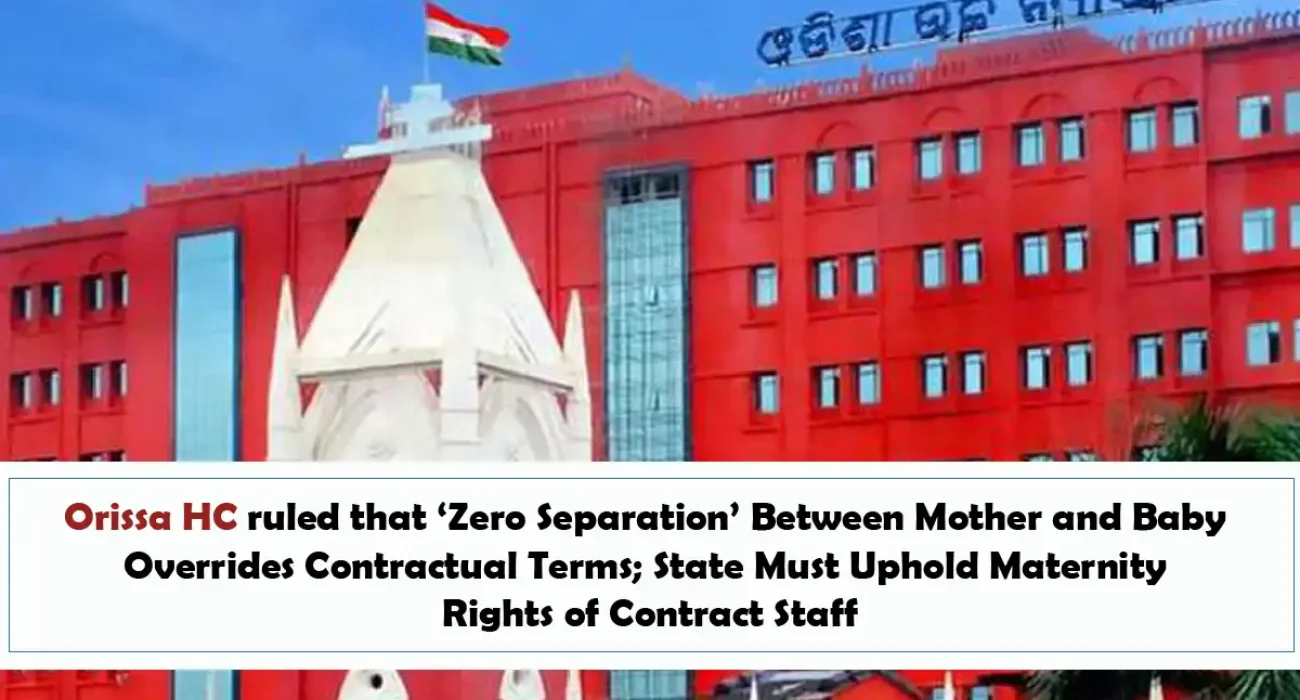

Table of Contents
ToggleThe respondent-employee was engaged since May 2014 as a “young professional” in the Health & Family Welfare Department of the appellant-State, initially through a one-year contract, which was subsequently renewed successively. In 2018, after delivering a female child, the respondent applied for grant of maternity leave for the period between 17.08.2016 to 12.02.2017.
The department turned down her request without giving any reasons. Aggrieved by this, the respondent filed a writ petition before the single-judge bench of the Orissa High Court. The learned Single Judge quashed the rejection of maternity leave, opining that the respondent was unjustly denied the benefit, and directed the authorities to extend the benefit of maternity leave to the respondent.
The present appeal before the Division Bench of the High Court arose out of the State’s challenge to that decision.
The appellant contended that since the respondent is not a regular employee but a contractual hire, whose service is governed by the terms of the contract, she is not entitled to maternity benefits unless such benefits are specifically included within the contract. It was further argued that the memorandum issued by the Finance Department of the Government dated 31.03.2012, which extends maternity benefit to all female employees in Government establishments, applies only to civil servants and not to ad-hoc or contract professionals.
Additionally, the State submitted that the learned Single Judge failed to remand the matter back for reconsideration, despite the initial order being non-speaking and devoid of reasons.
The respondent, relying on the Supreme Court judgment in Dr. Kabita Yadav v. Secretary, Ministry of Health & Family Welfare Department, contended that a narrow application of the 2012 Government Memorandum, which includes only civil servants, creates an ‘artificial bifurcation’ among women employees based on the nature of their employment—regular or contractual—which violates Article 14 of the Indian Constitution.
The Division Bench upheld the Single Judge’s decision and strongly rejected the appellant’s restrictive interpretation of maternity benefits.
“The idea of maternity leave is structured on ‘zero separation’ between lactating mother and breast-feeding baby… A lactating mother has a fundamental right to breastfeed her baby… Similarly, baby has a fundamental right to be breastfed… These two important rights form an amalgam from which the State obligation to provide maternity benefits… would arise.”
The Court emphasized India’s international commitments under the ICESCR and CEDAW. “Under the provisions of CEDAW, maternity leave with pay or comparable social benefits are to be assured by the party States… The Convention highlights the social significance of ‘maternity’ and the role of both parents in the family structure.”
The Court also addressed the issue of reasoned orders: “It hardly needs to be stated that giving reasons for the decisions is imperative in good governance… An employee cannot be told that the reasons are stacked in the Godown of the Government, and he/she can search for the same all in wilderness.”
Rejecting the argument that contract terms override public policy, the Court stated that
“Every employment, be it private or public, begins with contract… A Welfare State cannot be heard to say that a Policy of the kind has to be kept away regardless of its socio-welfare object… This does not mean that Court cannot read the State Policy into the terms of engagement, in the absence of a contra indication in the contract itself.”
Citing precedents from multiple High Courts, the Bench reaffirmed that maternity benefits must apply to all female employees, regardless of contractual status. It also reiterated the applicability of Kabita Yadav and observed that “Denying maternity benefit on the basis of nature of employment is abhorrent to the notions of humanity and womanhood… Gods rejoice where women are honoured… Such ideal things should animate the purposive interpretation of State Policy concerning the welfare of women.”
The Court drew from international law, noting that “Jurists like J.G. Starke… opine that Conventions of the kind are the customary source of Rules of International Law, which the party-States are expected to honour even in their domestic affairs, there being nothing contrary in the Domestic Law.”
Quoting Justice Oliver Wendell Holmes: “Constitutions are intended to preserve practical and substantial rights, not to maintain theories.”
The Division Bench concluded that the appeal was devoid of merits and rejected it in limine. The impugned order of the learned Single Judge was upheld. The State was directed to implement the relief granted and file a compliance report within eight weeks.
The Orissa High Court’s ruling reaffirms that maternity leave is a socio-legal right rooted in constitutional equality and cannot be restricted by the contractual status of a woman’s employment.
Written by Adv. Prerna Murarka, reviewed by Adv. Deeksha Rai
IAW resources
Browse our help directory